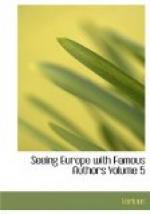[Footnote A: From “A Winter in Russia.” By permission of, and by arrangement with, the publishers, Henry Holt & Co. Copyright, 1874. Since Gautier wrote, Berlin has greatly increased in population and in general importance. What is known as “Greater Berlin” now embraces about 3,250,000 souls. Many of the quaint two-story houses, which formerly were characteristic of the city, have given way to palatial houses and business blocks. Berlin is a thoroughly modern commercial city. It ranks among European cities immediately after London and Paris.]
CHARLOTTENBURG[A]
BY HARRIET BEECHER STOWE
Then we drove to Charlottenburg to see the Mausoleum. I know not when I have been more deeply affected than there; and yet, not so much by the sweet, lifelike statue of the queen as by that of the king, her husband, executed by the same hand.[B] Such an expression of long-desired rest, after suffering the toil, is shed over the face—so sweet, so heavenly! There, where he has prayed year after year—hoping, yearning, longing—there, at last, he rests, life’s long anguish over! My heart melted as I looked at these two, so long divided—he so long a mourner, she so long mourned—now calmly resting side by side in a sleep so tranquil.
We went through the palace. We saw the present king’s writing desk and table in his study, just as he left them. His writing establishment is about as plain as yours. Men who really mean to do anything do not use fancy tools. His bedroom, also, is in a style of severe simplicity. There were several engravings fastened against the wall; and in the anteroom a bust and medallion of the Empress Eugenie—a thing which I should not exactly have expected in a born king’s palace; but beauty is sacred, and kings can not call it parvenu. Then we went into the queen’s bed-room, finished in green, and then through the rooms of Queen Louisa. Those marks of her presence, which you saw during the old king’s lifetime, are now removed; we saw no traces of her dresses, gloves, or books. In one room, draped in white muslin over pink, we were informed the Empress of Russia was born.
In going out to Charlottenburg, we rode through the Thiergarten, the Tuileries of Berlin. In one of the most quiet and sequestered spots is the monument erected by the people of Berlin to their old king. The pedestal is Carrara marble, sculptured with beautiful scenes called garden pleasures—children in all manner of outdoor sports, and parents fondly looking on. It is graceful, and peculiarly appropriate to those grounds where parents and children are constantly congregating. The whole is surmounted by a statue of the king, in white marble—the finest representation of him I have ever seen. Thoughtful, yet benign, the old king seems like a good father keeping a grave and affectionate watch over the pleasures of his children in their garden frolics. There




